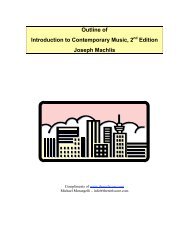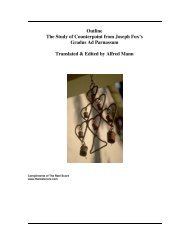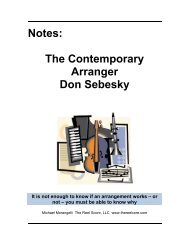An Outline of The History of Western Music Grout ... - The Reel Score
An Outline of The History of Western Music Grout ... - The Reel Score
An Outline of The History of Western Music Grout ... - The Reel Score
Create successful ePaper yourself
Turn your PDF publications into a flip-book with our unique Google optimized e-Paper software.
1. Forerunners<br />
a) Opera is a drama that combines soliloquy, dialogue, scenery, action, and<br />
continuous (or nearly continuous) music<br />
(1) Earliest works in this genre date from the very end <strong>of</strong> the 16th century<br />
(2) But the association <strong>of</strong> music with drama goes back to ancient times<br />
i) the choruses and some lyric speeches in the plays <strong>of</strong> Euripides and<br />
Sophocles were sung<br />
ii) medieval liturgical dramas were sung and music figures - if incidentally - in<br />
the religious mystery & miracle plays <strong>of</strong> the late middle ages<br />
b) Renaissance theater <strong>of</strong> the 16th century<br />
(1) Many tragedies & comedies imitated Greek models - the choruses were<br />
sometimes sung - at the opening or ending <strong>of</strong> an act<br />
i) Greek tragedy served as a distant model for the Renaissance theater -<br />
scholars <strong>of</strong> the time disagreed on how centrally music figured in Greek<br />
drama<br />
a- only choruses sung<br />
b- entire text was sung - including actors' parts as expressed by Girolamo<br />
Mei (1519-1594)<br />
(2) Intermedi: pastoral, allegorical, or mythological interludes- <strong>of</strong>fering<br />
spectacular and elaborate musical productions, with choruses, soloists, and<br />
large instrumental ensembles - between acts <strong>of</strong> a comedy or tragedy<br />
(3) Madrical Cycles: the madrigal as a miniature drama - represented a series <strong>of</strong><br />
scenes or moods or wove a simple comic plot in dialogue<br />
(4) <strong>The</strong> Pastoral: the pastoral poem - telling <strong>of</strong> idyllic love in loosely dramatic<br />
form - a predominant genre <strong>of</strong> Italian verse composition provided one model<br />
for early musical plays<br />
i) music seemed not only the natural mode <strong>of</strong> communication but the missing<br />
link to the poets' visions and longings<br />
ii) pastoral poetry was at once the last stage <strong>of</strong> the madrigal and the first stage<br />
<strong>of</strong> the opera libretto<br />
c) <strong>The</strong> Florentine Camerata<br />
(1) Girolamo Mei (1519-1594) a Florentine scholar who had edited a number <strong>of</strong><br />
Greek tragedies and when in Rome had embarked on a thorough<br />
investigation <strong>of</strong> Greek <strong>Music</strong> - particularly its role in theater<br />
i) between 1562 & 1573 he read - in Greek - almost every ancient work on<br />
music that survived<br />
ii) reported his work in 4 books - "De Modis" (Concerning the Modes) - parts <strong>of</strong><br />
which were communicated to his colleagues in Florence.<br />
a- the Greeks obtained powerful effects with their music because it<br />
consisted <strong>of</strong> a single melody - whether sung by a soloist with or without<br />
accompaniment or by a chorus<br />
b- this melody could move the listener through the natural expressiveness <strong>of</strong><br />
vocal registers, rises and falls in pitch, and the changing rhythms and<br />
tempo<br />
(2) Giovanni Bardi (1534-1612) one <strong>of</strong> his most frequent correspondents - with<br />
Vincenzo Galilei (1520?-1591) - hosted and informal academy at his palace<br />
in Florence with discussions on literature, science, and the arts with<br />
musicians perfoming new music





